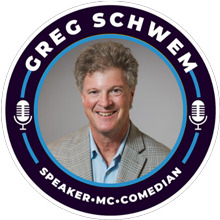Note: Greg Schwem will never stop talking to himself. It’s what corporate comedians do.
I pulled open the desk drawers in my office one by one. “Where are they?” I asked.
My wife, hearing my distressed cries from the hallway, entered. “Where are what?”
I ignored her. “They were right here next to my phone. What did I do with them?”
“Do with what?” she asked, growing impatient. “And who are ‘them?’”
“Did the kids take them? How many times have I told them to put things back? Particularly these.”
“Stop it!” my wife said. “What are you looking for? And why are you ignoring me?”
“I’m searching for my car keys,” I said. “And I’m ignoring you based on advice I received from the Quarterly Journal of Experimental Psychology.”
“I can help you search,” she said. “But I don’t think I can help you with your psychological issues, whatever they are.”
Handing her my phone, I asked that she read the article I had stumbled across through my Twitter feed. Citing a 2011 study from the quarterly journal, the updated article concluded that “self-directed speech,” aka “talking to oneself,” aka “kids, stay away from that creepy guy ranting to nobody,” actually allows a human to locate objects and solve problems faster.
If this theory is correct, I should be the world’s foremost problem solver and lost item finder, for I have been a self-talker long past the years when I arranged competing armies of toy soldiers in my bedroom and loudly implored them to “fight for your honor.” Of course, today’s self-talking, toy soldier playing children probably say, “If you’re wounded in battle, good luck dealing with the VA,” but that’s another story.
Before hands-free cellphone technology appeared in cars, one could glance over and see me at stoplights, vocally working on jokes for an upcoming stand-up comedy performance. On the golf course I carry on a loud, never ending inner conversation, mostly querying myself as to why I chose the 6-iron, why I didn’t realize the putt broke left instead of right, and why hadn’t I acted on last week’s declaration to give up this ridiculous game, a vow most of the other course patrons heard after I carded a sextuple bogey.
I come from a long line of self-talkers. My mother admits to the habit and my grandmother, after losing her husband, used to say she talked to herself because, “otherwise I don’t know what I sound like.”
My wife often catches me deep in self-talk mode. She demands to know who I’m speaking with, and the general topic.
How nice that I now can deflect her inquiries by simply telling her that I’m improving my brain’s functions, and to please not interrupt me the next time.
“Try it honey,” I implored her. “Maybe it will make you feel smarter.”
“So you’re saying I’m stupid?”
“Not at all,” I replied, quickly realizing that, at this particular moment, I wished I was the only person in the room.
“Please stop,” she said. “Every time I hear you, I always think you’re talking about me. And not in a good way.”
To appease her, I Googled “How to stop talking to yourself.” Solutions ranged from keeping Post-It notes with me so I could write down my thoughts as opposed to saying them out loud or, better yet, sending those same thoughts to myself via emails. I immediately scrapped the email idea; my already cluttered inbox does not need messages containing the subject line “Where are my #$%!@ keys?!!!”
But, in an effort to keep peace with everybody in my family, my inner self included, I’m trying the Post-It note idea. But already I’m having misgivings for I fear I will eventually be barred from my local golf course.
Management doesn’t take kindly to a golfer who angrily throws Post-It notes into the lake that just claimed his golf ball.



The F-Bomb Has Gone Mainstream — And Nobody Cares Anymore